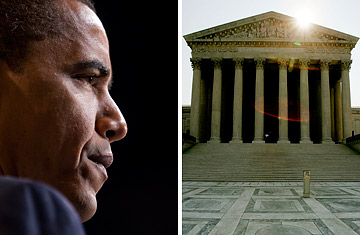
When the Supreme Court issues rulings on hot-button issues like gun control and the death penalty in the middle of a presidential campaign, Republicans could be excused for thinking they'll have the perfect opportunity to paint their Democratic opponent as an out-of-touch social liberal. But while Barack Obama may be ranked as one of the Senate's most liberal members, his reactions to this week's controversial court decisions showed yet again how he is carefully moving to the center ahead of the fall campaign.
On Wednesday, after the Supreme Court ruled that the death penalty was unconstitutional in cases of child rape, Obama surprised some observers by siding with the hardline minority of Justices Scalia, Thomas, Roberts and Alito. At a press conference after the decision, Obama said, "I think that the rape of a small child, six or eight years old, is a heinous crime and if a state makes a decision that under narrow, limited, well-defined circumstances the death penalty is at least potentially applicable, that that does not violate our Constitution."
Then Thursday, after Justice Scalia released his majority opinion knocking down the city of Washington's ban on handguns, Obama said in a statement, "I have always believed that the Second Amendment protects the right of individuals to bear arms, but I also identify with the need for crime-ravaged communities to save their children from the violence that plagues our streets through common-sense, effective safety measures. The Supreme Court has now endorsed that view."
John McCain's camp wasted no time in attacking, with one surrogate, conservative Senator Sam Brownback of Kansas, calling Obama's gun control statement "incredible flip-flopping." McCain advisor Randy Scheunemann was even tougher in a conference call Thursday. "What's becoming clear in this campaign," Scheunemann said, is "that for Senator Obama the most important issue in the election is the political fortunes of Senator Obama. He has demonstrated that there really is no position he holds that isn't negotiable or isn't subject to change depending on how he calculates it will affect his political fortunes."
Politicians are always happy to get a chance to accuse opponents of flip-flopping, but McCain's team may be more afraid of Obama's shift to the center than their words betray. Obama has some centrist positions to highlight in the general election campaign on foreign policy and national security, social issues and economics. His position on the child rape death penalty case, for example, is in line with his record in Illinois of supporting the death penalty. He is on less solid ground on the gun ban as his campaign said during the primary that he believed the D.C. law was constitutional.
A top legal adviser to Obama says both cases are consistent with his previous positions. "I don't see him as moving in his statements on the death penalty or the gun case," says Cass Sunstein, a former colleague of Obama's at the University of Chicago. Sunstein says Obama is "not easily characterized" on social issues, and says the Senator's support for allowing government use of the Ten Commandments in public, in some cases, is another example of his unpredictability on such issues. On the issue of gun control, he says Obama has always expressed a belief that the Second Amendment guarantees a private right to bear arms, as the court found Thursday.
But Obama's sudden social centrism would sound more convincing in a different context. Since he wrapped up the primary earlier this month and began to concentrate on the independent and moderate swing voters so key in a general election, Obama has consistently moved to the middle. He hired centrist economist Jason Furman, known for defending the benefits of globalization and private Social Security accounts, to the displeasure of liberal economists. On Father's Day, Obama gave a speech about the problem of absentee fathers and the negative effects it has on society, in particular scolding some fathers for failing to "realize that what makes you a man is not the ability to have a child — it's the courage to raise one." Last week, after the House passed a compromise bill on domestic spying that enraged liberals and civil libertarians, Obama announced that though he was against other eavesdropping compromises in the past, this time he was going to vote for it.
Whether Obama's new centrist sheen is the result of flip-flopping or reemphasizing moderate positions, the Supreme Court decisions have focused attention again on the role of the court in the campaign season. McCain himself is vulnerable to charges of using the Supreme Court for political purposes. Earlier this month, when the court granted habeas corpus rights to accused terrorist prisoners at Guantanamo Bay, McCain attacked the opinion in particularly harsh language, though advisers say closing the prison there is high on his list of actions to rehabilitate America's image around the world.
Liberals are hoping that despite Obama's moderate response to the Supreme Court decisions, the issues alone will rally supporters to him. "What both of these decisions say to me is that the Supreme Court really is an election-year issue," says Kathryn Kolbert, president of People For the American Way. "We're still only one justice away from a range of really negative decisions that would take away rights that most Americans take for granted," she says.
And Obama's run to the center surely won't stop conservatives from using the specter of a Democratic-appointed Supreme Court to try to rally support. "Its pretty clear that if he's elected and Justice Scalia or Kennedy retires that he's going to appoint someone who's very likely to reverse [the gun control decision]," says Eugene Volokh, a professor at the UCLA School of Law. Given how Obama has been responding to the recent Supreme Court decisions, however, you're not likely to hear him talking about appointing liberal justices much between now and November.
